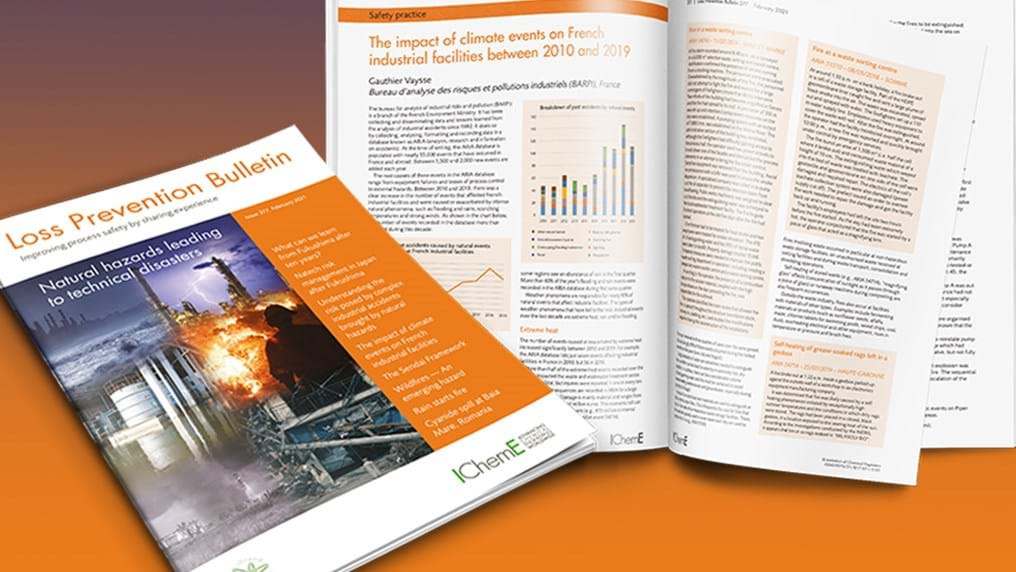Special Loss Prevention Bulletin issue to mark Fukushima and natural disaster events

8th February 2021
A special edition of the Institution of Chemical Engineers’ (IChemE) Loss Prevention Bulletin has been published to mark the 10th anniversary of the Fukushima Daiichi Nuclear Power Plant failure in Japan. The special issue also considers other natural hazards leading to technological (Natech) events.
The Loss Prevention Bulletin: Natural Hazards Leading to Technical Disasters looks at process safety learnings 10 years on from the 9.1 magnitude Tōhoku earthquake and subsequent tsunami that resulted in a cooling system failure and a level 7 nuclear meltdown at the power plant – the top accident level on the International Nuclear and Radiological Event Scale. The release of radioactive materials into the air and water, together with raging fires and disruption in numerous oil refineries and depots, ultimately saw 154,000 people in the community evacuated. Health effects from the disaster are still to be fully determined.
The Loss Prevention Bulletin (LPB) is the leading source of process safety case studies with a 45-year archive of lesson learned from accidents. This special edition and all issues of the LPB are free for IChemE members.
Experts from a range of fields have compiled the special issue to look, not only at the learnings from Fukushima, but explore how process engineers seek to understand the risks posed by complex industrial accidents brought about by the clash of natural and man-made hazards. It reviews other emerging issues exacerbated by climate change, such as hurricanes, floods and wildfires.
The issue urges process safety engineers to learn from past incidents, consider such events during design and develop robust emergency plans for safely managing the impacts of natural disasters on operations.
Fiona Macleod, Chair of the LPB Editorial Panel, said:
“How can we best plan to safely handle operations when all safety layers are wiped out by nature? It is vital for everyone working in process safety to understand and prepare for the worst-case scenarios, including potentially catastrophic natural and man-made hazards.
“This anniversary serves as a reminder that as process safety professionals we have the responsibility and expertise to design intrinsically safe processes and robust emergency plans, identifying specific hazards and risks, to reduce the risk of technological system failures resulting from natural disasters so we can help keep people safe.
“We have developed this special issue to help play our role in sharing knowledge of lessons learned and good practices to minimise the knock-on effects when these natural disasters strike.”
Read the special issue at www.icheme.org/lpb-latest-issue.
Elisabeth Krausmann’s paper, Natech risk management in Japan after Fukushima – What have we learned?, is also freely available to those who do not subscribe to the Loss Prevention Bulletin.
The LPB Editorial Panel is looking for contributions. If you have a real-life process safety story to share, you can contact the panel via Tracey Donaldson, Editor of Publications at IChemE, at TDonaldson@icheme.org.
Links
Natural Hazards Leading to Technical Disasters - Loss Prevention Bulletin special issue
Natech risk management in Japan after Fukushima – What have we learned?
Contact
For more information please contact:
Rachael Fraser, Communications Executive, IChemE
t: +44 (0) 1788 534435
e: rfraser@icheme.org
Ketna Mistry, Communications Executive, IChemE
t: +44 (0) 1788 534484
e: kmistry@icheme.org
What is chemical engineering
Chemical, biochemical and process engineering is the application of science, maths and economics in the process of turning raw materials into everyday, and more specialist, products. Professional chemical engineers design, construct and manage process operations all over the world. Oil and gas, pharmaceuticals, food and drink, synthetic fibres and clean drinking water are just some of the products where chemical engineering plays a central role.
IChemE
The Institution of Chemical Engineers (IChemE) advances chemical engineering's contribution worldwide for the benefit of society. We support the development of chemical engineering professionals and provide connections to a powerful network of over 33,000 members in more than 100 countries.
We support our members in applying their expertise and experience to make an influential contribution to solving major global challenges, and are the only organisation permitted to award Chartered Chemical Engineer status and Professional Process Safety Engineer registration.